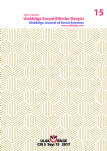INVESTIGATION OF THE MONETARY POLICY PRACTICES IN 2001 AND 2008 TURKISH CRISES
INVESTIGATION OF THE MONETARY POLICY PRACTICES IN 2001 AND 2008 TURKISH CRISES
Author(s): Semra TAŞPUNAR ALTUNTAŞSubject(s): National Economy, Supranational / Global Economy, Economic history, Economic policy, Transformation Period (1990 - 2010), Financial Markets
Published by: Sanat ve Dil Araştırmaları Enstitüsü
Keywords: Monetary Policy; Crisis; Financial Economy; Structural Breaks;
Summary/Abstract: The rapid financialization of the world economy after eighties, brought with it increasingly widespread economic crises. These crises, which are originated from financial markets in general, have brought shrinkage and depression in the real economy. In the beginning, the crises were reacted with the channels of monetary policy. However, the spread of the crises to the long term, the failure of the applied monetary policies to create the desired effect, led to negative views towards monetary policies and therefore central banking. Two major economic crises in Turkey over the past two decades have led policy makers and academics to rethink the views of macroeconomics and monetary policy.The nature of the relationship between the Central Bank's inflation and the alternative monetary policy instruments used in Turkey during the research period is analyzed comparatively in the context of 2001 and 2008 crisis periods. While the effect of monetary policy variables on price is investigated using the ARDL boundary test method in the framework of the forecasting model created for this purpose, policy breakdowns and price breaks are investigated with multiple structural breakdown test. The shocks that are common in countries dependent on foreign economies such as Turkey, foreign dependency and foreign capital inflows, which are typical characteristics of these economies, remove the applied monetary policies. It is thought that there is not a stable and predictable relationship between inflation and monetary policy instruments in Turkey. Thus, starting from the hypothesis that there is no stable and predictable relationship between inflation and monetary policy instruments in Turkey, in the framework of crisis periods in 2001 and 2008, investigations into whether monetary policy applications are effective in predicting and directing crises. The relationship between the policy changes during the period 1999-2015 and the structural breaks in the variables will be examined and the effectiveness of the monetary policy variables will be tested in terms of price stability.
Journal: Ulakbilge Sosyal Bilimler Dergisi
- Issue Year: 5/2017
- Issue No: 15
- Page Range: 1395-1412
- Page Count: 18
- Language: English

